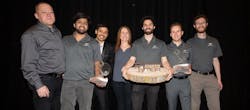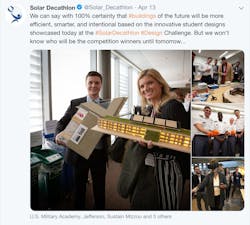Solar Decathlon Fueled By Next-Gen Energy
As a proud member of Hokie Nation, I’m pleased to share the news that the Virginia Tech team was the Grand Challenge Winner in this year’s U.S. Dept. of Energy Solar Decathlon Design Challenge Weekend. The Solar Decathlon began in 2002 and became a biennial event beginning in 2005. This year’s competition was held April 12–14 at the National Renewable Energy Laboratory (NREL) in Golden CO, and included 45 finalist teams from 37 colleges and universities in the U.S. and six other countries.
- Virginia Tech was named this year's Grand Challenge Winner.
The teams are challenged to combine their engineering and architectural skills in order to design and construct high-efficiency buildings powered by renewable energy. The winning projects must demonstrate technical innovation, as well as an understanding of market factors. To view the weekend photo gallery, click here.
In the 2011 Solar Decathlon, I had the privilege of assisting the student team at Florida International University (FIU) with its PerFORM[D]ance House. Modeled after the Olympic decathlon, the competition then consisted of 10 contests, designed to evaluate the performance, livability, and affordability of the houses. Each contest was worth a maximum of 100 points and was measured and/or juried:
- Architecture Contest (juried)
- Market Appeal Contest (juried)
- Engineering Contest (juried)
- Communications Contest (juried)
- Affordability Contest (juried)
- Comfort Zone Contest (measured)
- Hot Water Contest (measured)
- Appliances Contest (measured)
- Home Entertainment Contest (measured and juried)
- Energy Balance Contest (measured)
Although the FIU team didn’t win the overall competition, they did achieve zero net energy to tie for first place in the Energy Balance Contest, and all of the student participants received a hands-on experience and unique training that helped to prepare them to enter the clean energy workforce. This international competition has been a driving force in raising awareness about clean energy since its inception. Technologies and solutions used in Solar Decathlon homes have advanced the residential building industry both in the U.S. and abroad.
In other words, Solar Decathlon is more than a competition. It’s an intensive learning experience for consumers and homeowners, as well as for the students, as they experience the latest technologies and materials in energy-efficient design, clean energy technologies, smart home solutions, water conservation measures, electric vehicles, and high-performance buildings.
So, I offer my congratulations to Virginia Tech, and to all of the other participating schools in this year’s competition!
To view the 2019 winning teams and project summaries, click here.
A regular contributor to HPAC Engineering and a member of its editorial advisory board, the author is a principal at Sustainable Performance Solutions LLC, a south Florida-based engineering firm focusing on energy and sustainability.
About the Author
Larry Clark
A member of HPAC Engineering’s Editorial Advisory Board, Lawrence (Larry) Clark, QCxP, GGP, LEED AP+, is principal of Sustainable Performance Solutions LLC, a South Florida-based engineering firm focused on energy and sustainability consulting. He has more than two dozen published articles on HVAC- and energy-related topics to his credit and frequently lectures on green-building best practices, central-energy-plant optimization, and demand-controlled ventilation.


